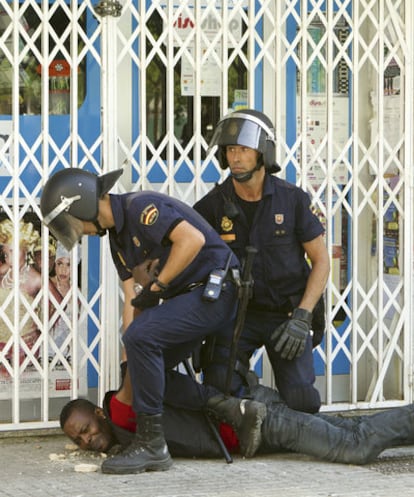A debt of only 43 euros brings racial tensions to surface in Palma
The death of a Nigerian man has revealed a hidden ethnic conflict
In Palma de Mallorca work is underway to calm the effects of an outbreak of racial violence in the impoverished neighborhood of Son Gotleu following the death of a young Nigerian man there last week. Confrontations between tens of sub-Saharan Africans and Gypsy clans over the dealing of drugs have come in the wake of the death of Efosa Okosun, who fell from a fifth-floor apartment on to the sidewalk. Friends of the man say he was thrown by two Gypsy men who were chasing him.
The international population - Son Gotleu has the highest proportion of immigrants in Mallorca at 38 percent - and other problems have piled up on the streets of Palma. "Fears and grudges have been aroused," notes Maribel Alcázar, a Palma City Hall mediator who specializes in social conflicts. "A particularly tragic event has caused a collective reaction, a momentary explosion of rage."
The disturbances flared up in the early hours of August 29 and continued the following day. The spark for the fatal event had been a 43 eurodebt for a few grams of marijuana and an unpaid cellphone. The victim fled to a rooftop after being harassed by two drug dealers and fell to his death. After the event, his enraged countrymen hit the streets to demand justice, resulting in brawls, damage and confrontations with the police, who arrested five African men.
"It has been a lesson in savagery" and a "terrible Nigerian uprising," says the former politician Ginés Quiñonero, president of one of the neighbors' associations. Previously a left-winger, Quiñonero has turned populist. He is the local negotiator of Palma Mayor Mateo Isern of the Popular Party, who has demanded "law, order and more police." Isern wants "a strong police, unrelenting with the criminals; so it is they who feel hounded and not the citizens."
Quiñonero is battling for the closure of "conflictive" premises and the expulsion of illegal immigrants. And he is calling upon his mayor to follow the tough immigration policies of Badalona Mayor Xavier García Albiol.
The Nigerian community says all it wants is for the death to be solved. "Now there is peace," says a spokesman for the Nigerian group. "It doesn't matter now. What my people want is justice, to clear up the murder of Efosa."
"The drug traffickers have no interest in the neighborhood confrontations because they increase the police presence," explains a police captain.
There's an appearance of normality and watchfulness in the area now. "In general there is a certain contempt between Gypsies and Africans but they live together well in certain blocks," says Alcázar.
Always a hot spot, according to the inspector, the area remains "completely and utterly calm, without the tension there was after the incidents." You don't notice the control measures.
A hundred officers and ten vehicles were mobilized during the disturbances. A police unit protecting the king on his summer vacation even entered the fray to curb the fallout. The area was front-page news for days and Son Gotleu was a top topic on Twitter.
In the second-half of the 20th century the area was a shining example of integration between immigrants and Mallorcans, but that changed a decade ago and it started to resemble certain Parisian housing projects. Now in this suburb just 1,500 meters from the beach there are blocks where Africans dominate and the shop fronts and city services are rundown and forgotten.
And the disruptive Quiñonero is starting to resemble a radical from one of those French neighborhoods. Secret leader of the Spanish Communist Party in the 1960s, tortured and imprisoned by the dictatorship, he was a Palma councilor for eight years under the Socialists. Now he makes extremist announcements, reviles the left and is shown on his blog with a bust of a Roman tribune. He cries out against "all that uncontrolled and rebellious African immigration that chokes and upsets us."
On Saturday ten NGOs working for a multicultural neighborhood cancelled a community event "to avoid crowds in such a hot moment." The scars are still recent. The Nigerians insist that Efosa was pushed, though nobody saw the fall or the fatal shove. It could be an incident between local drug dealers. It is not, however, a war among traffickers.
The idea of a racial conflict or social confrontation between Gypsies and Africans is denied by those seen as interlocutors for both ethnic groups. Joaquín Fernández, a Gypsy entrepreneur, and Robert Uwagboe, a Nigerian worker, have spoken up and laid out the current peace in various meetings with the authorities, police and mediators.
"There is a collision," sums up a local shop owner. "The Gypsies arrived first and some made a living from drugs. Later the Africans arrived, who dealt and controlled prostitution. It will all calm down. It just needs more of a clean-up and more security."

Tu suscripción se está usando en otro dispositivo
¿Quieres añadir otro usuario a tu suscripción?
Si continúas leyendo en este dispositivo, no se podrá leer en el otro.
FlechaTu suscripción se está usando en otro dispositivo y solo puedes acceder a EL PAÍS desde un dispositivo a la vez.
Si quieres compartir tu cuenta, cambia tu suscripción a la modalidad Premium, así podrás añadir otro usuario. Cada uno accederá con su propia cuenta de email, lo que os permitirá personalizar vuestra experiencia en EL PAÍS.
¿Tienes una suscripción de empresa? Accede aquí para contratar más cuentas.
En el caso de no saber quién está usando tu cuenta, te recomendamos cambiar tu contraseña aquí.
Si decides continuar compartiendo tu cuenta, este mensaje se mostrará en tu dispositivo y en el de la otra persona que está usando tu cuenta de forma indefinida, afectando a tu experiencia de lectura. Puedes consultar aquí los términos y condiciones de la suscripción digital.








































